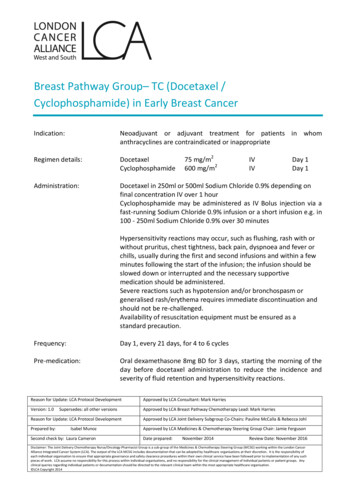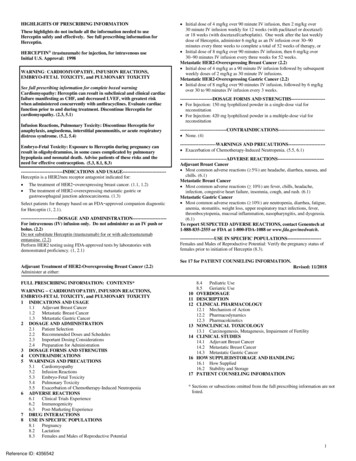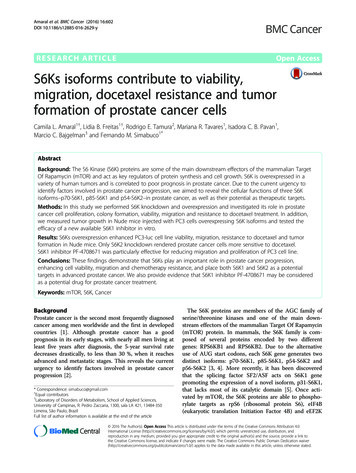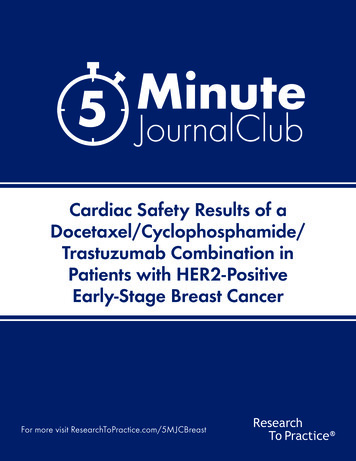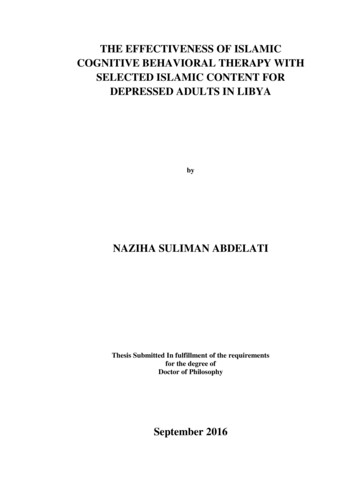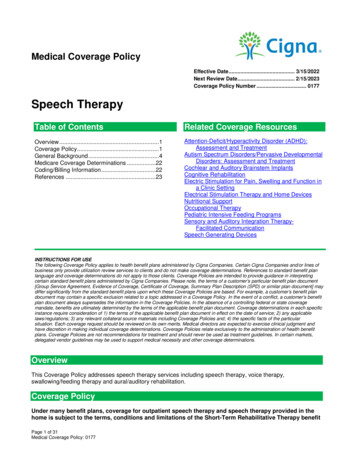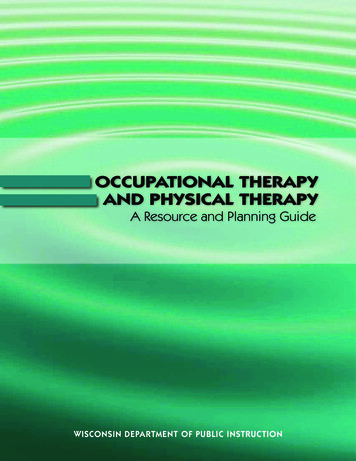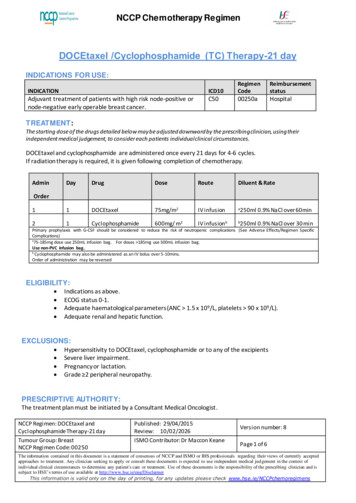
Transcription
NCCP Chemotherapy RegimenDOCEtaxel /Cyclophosphamide (TC) Therapy-21 dayINDICATIONS FOR djuvant treatment of patients with high risk node-positive ornode-negative early operable breast cancer.C5000250aHospitalTREATMENT:The starting dose of the drugs detailed below may be adjusted downward by the prescribing clinician, using theirindependent medical judgement, to consider each patients individual clinical circumstances.DOCEtaxel and cyclophosphamide are administered once every 21 days for 4-6 cycles.If radiation therapy is required, it is given following completion of chemotherapy.AdminDayDrugDoseRouteDiluent & Rate11DOCEtaxel75mg/m2IV infusiona21Cyclophosphamide600mg/ m2IV infusionbbOrder250ml 0.9% NaCl over 60min250ml 0.9% NaCl over 30 minPrimary prophylaxis with G-CSF should be considered to reduce the risk of neutropenic complications (See Adverse Effects/Regimen SpecificComplications)a75-185mg dose use 250mL infusion bag. For doses 185mg use 500mL infusion bag.Use non-PVC infusion bag.bCyclophosphamide may also be administered as an IV bolus over 5-10mins.Order of administration may be reversedELIGIBILITY: Indications as above.ECOG status 0-1.Adequate haematological parameters (ANC 1.5 x 10 9 /L, platelets 90 x 109 /L).Adequate renal and hepatic function.EXCLUSIONS: Hypersensitivity to DOCEtaxel, cyclophosphamide or to any of the excipientsSevere liver impairment.Pregnancy or lactation.Grade 2 peripheral neuropathy.PRESCRIPTIVE AUTHORITY:The treatment plan must be initiated by a Consultant Medical Oncologist.NCCP Regimen: DOCEtaxel andCyclophosphamide Therapy-21 dayTumour Group: BreastNCCP Regimen Code: 00250Published: 29/04/2015Review: 10/02/2026ISMO Contributor: Dr Maccon KeaneVersion number: 8Page 1 of 6The information contained in this document is a statement of consensus of NCCP and ISMO or IHS professionals regarding their views of currently acceptedapproaches to treatment. Any clinician seeking to apply or consult these documents is expected to use independent medical jud gement in the context ofindividual clinical circumstances to determine any patient's care or treatment. Use of these documents is the responsibility of the prescribing clinician and issubject to HSE’s terms of use available at http://www.hse.ie/eng/DisclaimerThis information is valid only on the day of printing, for any updates please check www.hse.ie/NCCPchemoregimens
NCCP Chemotherapy RegimenTESTS:Baseline tests: FBC, Renal and Liver profileRegular tests: FBC, Renal and Liver profile* as clinically indicated*See Adverse Effects/Regimen specific complications for guidelines regarding hepatic dysfunctionDisease monitoring:Disease monitoring should be in line with the patient’s treatment plan and any other test/s asdirected by the supervising Consultant.DOSE MODIFICATIONS: Any dose modification should be discussed with a ConsultantHaematological:Table 1: Dose modification for haematological toxicityANC (x10 9/L)Platelets (x109/L)Dose 1.5and 90100%1 – 1.49or70 to 9075% 1or 70Delay until ANC 1.5 and platelets 90 then give 75% of previous cycle doses.Febrile Neutropenia:Table 2: Dose modification for febrile neutropeniaEventDose reduction option1 st episode75% of previous cycle dose if day 1 ANC 1.5 and platelets 1002 nd episode50% of original cycle dose if day 1 ANC 1.5 and platelets 1003 rd episodeDiscontinue protocol.Note: Post one episode of ANC 1-1.49 x 109 /L or first episode of febrile neutropenia another considerationis the addition of G-CSF as secondary prophylaxis.NCCP Regimen: DOCEtaxel andCyclophosphamide Therapy-21 dayTumour Group: BreastNCCP Regimen Code: 00250Published: 29/04/2015Review: 10/02/2026ISMO Contributor: Dr Maccon KeaneVersion number: 8Page 2 of 6The information contained in this document is a statement of consensus of NCCP and ISMO or IHS professionals regarding their views of currently acceptedapproaches to treatment. Any clinician seeking to apply or consult these documents is expected to use independent medical jud gement in the context ofindividual clinical circumstances to determine any patient's care or treatment. Use of these documents is the responsibility of the prescribing clinician and issubject to HSE’s terms of use available at http://www.hse.ie/eng/DisclaimerThis information is valid only on the day of printing, for any updates please check www.hse.ie/NCCPchemoregimens
NCCP Chemotherapy RegimenRenal and Hepatic Impairment:Table 3: Dose modification in renal and hepatic impairmentDrugRenal ImpairmentHepatic ImpairmentDOCEtaxelNo dose reduction L/min) 2010-20 10Dose 2.5 ULNand 6 ULNAnd/orASTand/orALT 1.5 ULN 3.5 ULN(AST andALT)SerumbilirubinDose of DOCEtaxel75mg/m2And ULNStop treatmentunless strictlyindicated andshould be discussedwith a consultantSevere impairment: Clinical Decision100%75%50%Non-Haematological Toxicity:Table 4: Dose modification schedule based on adverse eventsAdverse reactionsRecommended dose modification of DOCEtaxelGrade 3 skin reactionDecrease dose to 60mg/m2If the patient continues to experience these reactions at 60Grade 2 peripheral neuropathymg/m2, the treatment should be discontinuedGrade 3 or 4 stomatitisSUPPORTIVE CARE:EMETOGENIC POTENTIAL:DOCEtaxel: Low risk (Refer to local policy)Cyclophosphamide: Moderate risk (Refer to local policy)PREMEDICATIONS: Dexamethasone 8 mg PO twice daily for 3 days, starting one day prior to each DOCEtaxeladministration unless contraindicated. Patient must receive minimum of 3 doses pre-treatment. Consideration may be given, at the discretion of the prescribing consultant, to the use of a singledose of dexamethasone 20mg IV immediately before chemotherapy where patients have missedtaking the oral premedication dexamethasone as recommended by the manufacturer (3,4).OTHER SUPPORTIVE CARE: Patients should have an increased fluid intake of 2-3 litres on day 1 to prevent haemorrhagic cystitisassociated with cyclophosphamide.NCCP Regimen: DOCEtaxel andCyclophosphamide Therapy-21 dayTumour Group: BreastNCCP Regimen Code: 00250Published: 29/04/2015Review: 10/02/2026ISMO Contributor: Dr Maccon KeaneVersion number: 8Page 3 of 6The information contained in this document is a statement of consensus of NCCP and ISMO or IHS professionals regarding their views of currently acceptedapproaches to treatment. Any clinician seeking to apply or consult these documents is expected to use independent medical jud gement in the context ofindividual clinical circumstances to determine any patient's care or treatment. Use of these documents is the responsibility of the prescribing clinician and issubject to HSE’s terms of use available at http://www.hse.ie/eng/DisclaimerThis information is valid only on the day of printing, for any updates please check www.hse.ie/NCCPchemoregimens
NCCP Chemotherapy RegimenADVERSE EFFECTS / REGIMEN SPECIFIC COMPLICATIONSThe adverse effects listed are not exhaustive. Please refer to the relevant Summary of Product Characteristics for fulldetails. Neutropenia: Most frequent adverse reaction. Fever or other evidence of infection must be assessedpromptly and treated appropriately. Frequent blood count monitoring should be conducted in allpatients treated with DOCEtaxel. DOCEtaxel should be administered when the neutrophil count is 1.5x109 cells/L.Neutropenic Enterocolitis: A number of cases of neutropenic enterocolitis have been reported inpatients treated with DOCEtaxel in France (5). This is a known and rare side effect of DOCEtaxel whichmay affect up to one in 1,000 people.Hypersensitivity Reactions: Patients should be observed closely for hypersensitivity reactions especiallyduring the first and second infusions of DOCEtaxel. Hypersensitivity reactions may occur within a fewminutes following the initiation of the infusion of DOCEtaxel, thus facilities for the treatment ofhypotension and bronchospasm should be available. If hypersensitivity reactions occur, minorsymptoms such as flushing or localized cutaneous reactions do not require interruption of therapy.However, severe reactions, such as severe hypotension, bronchospasm or generalised rash/erythemarequire immediate discontinuation of DOCEtaxel and appropriate therapy. Patients who have developedsevere hypersensitivity reactions should not be re-challenged with DOCEtaxel.Fluid Retention: Dexamethasone premedication must be given to reduce the incidence and severity offluid retention with DOCEtaxel. It can also reduce the severity of the hypersensitivity reaction.Extravasation: DOCEtaxel causes pain and tissue necrosis if extravasated. (Refer to local extravasationguidelines).Hepatic Dysfunction: DOCEtaxel undergoes hepatic metabolism. Hepatic dysfunction (particularlyelevated AST) may lead to increased toxicity and usually requires a dose reduction.SIADH (syndrome of inappropriate secretion of antidiuretic hormone): may occur in patients receivingcyclophosphamide, resulting in hyponatremia, dizziness, confusion or agitation, unusual tiredness orweakness. This syndrome is more common with doses 50 mg/kg and may be aggravated byadministration of large volumes of fluids to prevent hemorrhagic cystitis. The condition is self-limitingalthough diuretic therapy may be helpful in the situation when the patient has stopped urinating(especially if this occurs during the first 24 hours of cyclophosphamide therapy). Susceptible patientsshould be monitored for cardiac decompensation. DRUG INTERACTIONS: Risk of drug interactions causing increased concentrations of DOCEtaxel with CYP3A4 inhibitors. Thesedrugs also decrease the conversion of cyclophosphamide to both its active and inactive metabolites.Patients should also be counselled with regard to consumption of grapefruit juice.Risk of drug interactions causing decreased concentrations of DOCEtaxel with CYP3A4 inducers. Thesedrugs also increase the conversion of cyclophosphamide to both its active and inactive metabolites.Cyclophosphamide inhibits cholinesterase metabolism of suxamethonium which may prolong itsneuromuscular blocking effect.Current drug interaction databases should be consulted for more information.NCCP Regimen: DOCEtaxel andCyclophosphamide Therapy-21 dayTumour Group: BreastNCCP Regimen Code: 00250Published: 29/04/2015Review: 10/02/2026ISMO Contributor: Dr Maccon KeaneVersion number: 8Page 4 of 6The information contained in this document is a statement of consensus of NCCP and ISMO or IHS professionals regarding their views of currently acceptedapproaches to treatment. Any clinician seeking to apply or consult these documents is expected to use independent medical jud gement in the context ofindividual clinical circumstances to determine any patient's care or treatment. Use of these documents is the responsibility of the prescribing clinician and issubject to HSE’s terms of use available at http://www.hse.ie/eng/DisclaimerThis information is valid only on the day of printing, for any updates please check www.hse.ie/NCCPchemoregimens
NCCP Chemotherapy RegimenREFERENCES:1. Jones et al. Phase III Trial Comparing Doxorubicin plus cyclophosphamide with DOCEtaxel pluscyclophosphamide as adjuvant therapy for operable breast cancer. J Clin Oncol 2006;24(34):53817.2. Jones S et al. DOCEtaxel with cyclophosphamide is associated with an overall survival benefitcompared with doxorubicin and cyclophosphamide: 7-year follow-up of US Oncology ResearchTrial 9735. J Clin Oncol 2009;27(8):1177-83.3. Chouhan et al. Single premedication dose of dexamethasone 20mg IV before DOCEtaxeladministration. J Oncol Pharm Practice 2010;17(3): 155–1594. Rogers ES et al. Efficacy and safety of a single dose of dexamethasone pre DOCEtaxel treatment:The Auckland experience. Annals of Oncology (2014) 25 (suppl 4): iv517-iv5415. Fatal Neutropenic Enterocolitis With DOCEtaxel in France by Aude Lecrubier. Available athttp://www.medscape.com/viewarticle/8760146. Taxotere Summary of Product Characteristics. Accessed Jan 2021.Available at: ormation/taxotere-eparproduct-information en.pdf7. Endoxana Summary of Product Characteristics. Accessed Jan 2021. Available cence PA2299-027002 21122018112109.pdf8. Dosage Adjustment for Cytotoxics in Renal Impairment January 2009; North London CancerNetwork.9. Dosage Adjustment for Cytotoxics in Hepatic Impairment January 2009; North London CancerNetwork.10. NCCP Classification Document for Systemic Anti-Cancer Therapy (SACT) Induced Nausea CP Regimen: DOCEtaxel andCyclophosphamide Therapy-21 dayTumour Group: BreastNCCP Regimen Code: 00250Published: 29/04/2015Review: 10/02/2026ISMO Contributor: Dr Maccon KeaneVersion number: 8Page 5 of 6The information contained in this document is a statement of consensus of NCCP and ISMO or IHS professionals regarding their views of currently acceptedapproaches to treatment. Any clinician seeking to apply or consult these documents is expected to use independent medical jud gement in the context ofindividual clinical circumstances to determine any patient's care or treatment. Use of these documents is the responsibility of the prescribing clinician and issubject to HSE’s terms of use available at http://www.hse.ie/eng/DisclaimerThis information is valid only on the day of printing, for any updates please check www.hse.ie/NCCPchemoregimens
NCCP Chemotherapy 9/2021AmendmentModification of premedication regimenUpdated with new NCCP template,clarified title and dosing in renal andhepatic impairment and admin orderClarified use of G-CSF and updated reneutropenic enterocolitisUpdated dose modification of docetaxelin hepatic impairment tableStandardised administration ofdocetaxel and cyclophosphamideUpdate of route of administration forcyclophosphamide.Update of cyclophosphamide dosemodifications in hepatic impairmentAmended eligibility and emetogenicpotentialClarification of requirement for non-PVCinfusion bag onlyApproved ByDr Maccon KeaneDr Maccon KeaneProf Maccon KeaneProf Maccon KeaneProf Maccon KeaneProf Maccon KeaneProf Maccon KeaneProf Maccon KeaneComments and feedback welcome at oncologydrugs@cancercontrol.ie.NCCP Regimen: DOCEtaxel andCyclophosphamide Therapy-21 dayTumour Group: BreastNCCP Regimen Code: 00250Published: 29/04/2015Review: 10/02/2026ISMO Contributor: Dr Maccon KeaneVersion number: 8Page 6 of 6The information contained in this document is a statement of consensus of NCCP and ISMO or IHS professionals regarding their views of currently acceptedapproaches to treatment. Any clinician seeking to apply or consult these documents is expected to use independent medical jud gement in the context ofindividual clinical circumstances to determine any patient's care or treatment. Use of these documents is the responsibility of the prescribing clinician and issubject to HSE’s terms of use available at http://www.hse.ie/eng/DisclaimerThis information is valid only on the day of printing, for any updates please check www.hse.ie/NCCPchemoregimens
DOCEtaxel /Cyclophosphamide (TC) Therapy-21 day INDICATIONS FOR USE: INDICATION ICD10 Regimen Code Reimbursement status Adjuvant treatment of patients with high risk node-positive or . (See Adverse Effects/Regimen Specific Complications) a75-185mg dose use 250mL infusion bag. For doses 185mg use 500mL infusion bag.
